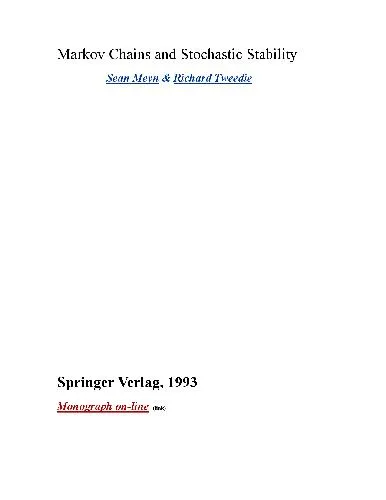Markov chains and stochastic stability
4.6
Reviews from our users

You Can Ask your questions from this book's AI after Login
Each download or ask from book AI costs 2 points. To earn more free points, please visit the Points Guide Page and complete some valuable actions.Related Refrences:
Introduction to "Markov Chains and Stochastic Stability"
"Markov Chains and Stochastic Stability" is a foundational text in the field of applied mathematics and stochastic processes, authored by Sean P. Meyn and Richard L. Tweedie. The book serves as both a textbook for advanced graduate courses and an authoritative reference for researchers, presenting a comprehensive and rigorous treatment of Markov chains, stochastic processes, and their stability properties. By exploring the mathematical underpinnings of these systems, the authors provide essential insights into both theory and applications, ranging from control theory to operations research and beyond.
Detailed Summary of the Book
At its core, "Markov Chains and Stochastic Stability" is a deep exploration of the theory of Markov chains, particularly focusing on their asymptotic and stability behavior. The text is divided into well-structured chapters that guide the reader from foundational principles to advanced topics, ensuring both novice learners and seasoned researchers can follow and benefit from the material.
The book begins with an introduction to fundamental concepts such as irreducibility, recurrent and transient states, stationary distributions, and ergodicity. From this foundation, the authors transition to a more comprehensive discussion of stability properties in Markov chains, specifically addressing topics such as Lyapunov functions, Foster–Lyapunov criteria, and drift conditions.
A distinguishing feature of the book is its emphasis on theoretical rigor while maintaining a connection to practical applications. Techniques are developed to study the stability of Markov chains in state spaces, both discrete and continuous, and the authors explore how such models arise in practice, particularly in control systems, queueing theory, and statistical physics. Advanced topics, such as Harris recurrence, uniform ergodicity, and regenerative processes, are treated in detail, making the book a critical resource for anyone studying stochastic processes in depth.
The book concludes with an extensive set of appendices and exercises, equipping readers with tools to deepen their understanding of the material and foster further exploration of stochastic processes.
Key Takeaways
- A rigorous, systematic development of Markov chain theory, with extensive coverage of concepts like stationarity, stability, and ergodic behavior.
- Introduction to Lyapunov methods for analyzing the stability of stochastic processes.
- Practical techniques for the application of Markov chain theory to real-world systems in engineering, economics, and operations research.
- Emphasis on both discrete and continuous state-space Markov chains, ensuring broad applicability of the results.
- Exercises and examples throughout the book to reinforce learning, combined with appendices offering deeper insights into advanced topics.
Famous Quotes from the Book
While this book is technical in nature and largely devoid of literary prose, several statements and insights stand out for their philosophical depth and clarity:
"The fundamental question in the study of Markov chains is not just existence but the properties of equilibrium distributions and how systems behave in the long run."
"Stability of a stochastic system is often not merely a theoretical curiosity, but a practical necessity for the design and functioning of technology and infrastructure."
These quotes encapsulate the authors’ motivation for writing this book and highlight the real-world importance of their theoretical framework.
Why This Book Matters
Stochastic processes, and in particular Markov chains, are foundational to many domains of modern mathematics, engineering, and data science. "Markov Chains and Stochastic Stability" is significant for several reasons:
First, it bridges the gap between theory and application. While many texts delve into the theoretical aspects of Markov processes, Meyn and Tweedie uniquely combine mathematical rigor with practical relevance. This has made the book a seminal reference for both academicians and professionals in industries involving stochastic modeling.
Second, the book has reshaped how stability analysis is approached in stochastic systems, bringing tools like Lyapunov functions to the forefront of stochastic modeling and analysis. By doing so, it has unlocked new possibilities for designing stable systems in areas as diverse as network traffic management, resource allocation, and robotics.
Finally, the book's influence extends well beyond the field of Markov chains. Its methodologies and insights have been widely adopted in other areas of mathematics, including probability theory, optimization, and machine learning. For any serious student or researcher in these disciplines, "Markov Chains and Stochastic Stability" is an indispensable guide.
In conclusion, this book stands as a pillar of modern stochastic systems theory, equipping its readers with the conceptual and mathematical tools to navigate complex probabilistic systems. Whether you are a mathematician, engineer, or researcher, Meyn and Tweedie’s work is certain to leave a lasting impact on your understanding of Markov chains and their stability.
Free Direct Download
You Can Download this book after Login
Accessing books through legal platforms and public libraries not only supports the rights of authors and publishers but also contributes to the sustainability of reading culture. Before downloading, please take a moment to consider these options.
Find this book on other platforms:
WorldCat helps you find books in libraries worldwide.
See ratings, reviews, and discussions on Goodreads.
Find and buy rare or used books on AbeBooks.
1216
بازدید4.6
امتیاز0
نظر98%
رضایتReviews:
4.6
Based on 0 users review
Questions & Answers
Ask questions about this book or help others by answering
No questions yet. Be the first to ask!







![The Ultimate iOS Interview Playbook: Conquer Swift, frameworks, design patterns, and app architecture [Team-IRA]](https://s3.refhub.ir/images/thumb/The_Ultimate_iOS_Interview_Playbook__Conquer__29925.webp)






